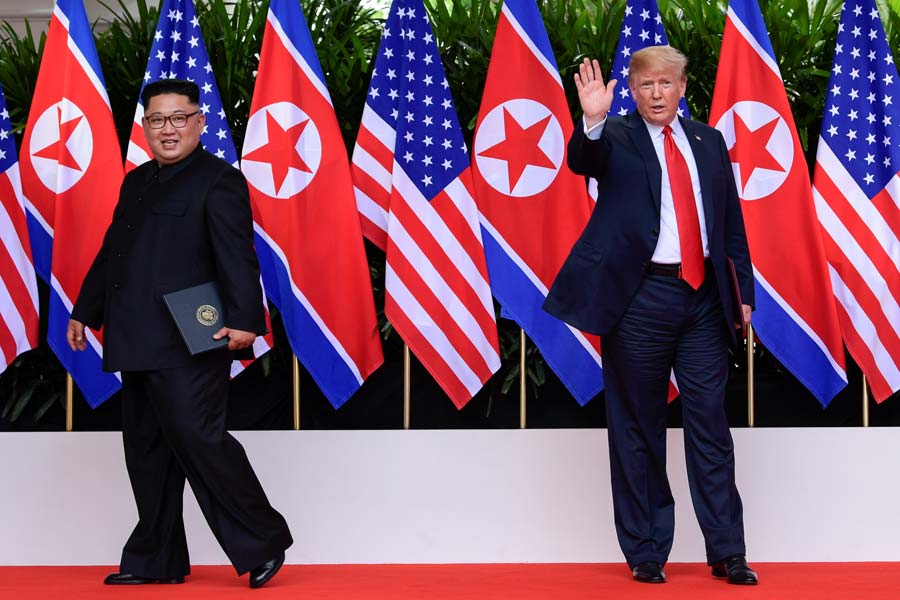China praises historic summit's progress

After their historic meeting on Tuesday at the Capella hotel on Sentosa island in Singapore, Democratic People’s Republic of Korea top leader Kim Jong-un and United States President Donald Trump signed a document that was hailed as a meaningful step toward solving Korean Peninsula issues. SUSAN WALSH / REUTERS
DPRK's Kim, US's Trump make commitment to denuclearization, security guarantees
China praised the decision made by Democratic People's Republic of Korea top leader Kim Jong-un and US President Donald Trump at their historic Singapore summit to start to resolve problems in the Korean Peninsula.
"It is an important progress made in pushing forward the denuclearization on the Korean Peninsula as well as its political settlement," the Foreign Ministry said on Tuesday in a statement after the summit concluded.
China spoke positively of related parties' efforts in making the meeting a success, and "it is also the common appeal of the international community", the statement said.
Trump and Kim concluded the summit by citing meaningful progress toward achieving peace and denuclearization of the Korean Peninsula.
A document signed after the summit by the two leaders affirmed Kim's commitment to complete denuclearization of the peninsula and Trump's commitment to provide security guarantees to the DPRK. That, Trump pledged, would include freezing US military exercises with the Republic of Korea while negotiations continue.
"We are prepared to start a new history and we are ready to write a new chapter between our nations," Trump said at a news conference after the summit. Trump expressed that people can all have hope that the Korean War, which was suspended in 1953 with an armistice, will soon end.
Trump praised the role China and President Xi Jinping have played.
"History has proven over and over again that adversaries can indeed become friends," Trump said.
Kim, speaking in Korean, said after the signing ceremony, "We had a historic meeting and decided to leave the past behind." He added, "The world will see a major change."
Kim left Singapore in the afternoon after signing the document. Before his private session with Trump in the morning, Kim said, "The path leading here was not easy."
"The old prejudices and practices worked as obstacles on our way forward, but we overcame all of them and we are here today."
The Foreign Ministry said that China is committed to realizing the denuclearization of the Korean Peninsula, maintaining peace and stability on the peninsula and peacefully resolving the peninsula issue through political talks between all relevant parties, and it has made unremitting efforts, it said.
"We hope and support the two countries to implement the consensus made by their leaders, promote follow-up negotiations, and further consolidate and expand the achievement, making the political settlement of the Korean Peninsula nuclear issue a sustainable and irreversible process," it said.
As a close neighbor and an important party involved, China stands ready to work with relevant parties and continue to be dedicated to realizing denuclearization on the peninsula as well as establishing the peace mechanism there, it said.
State Councilor and Foreign Minister Wang Yi said earlier on Tuesday that it is important and positive for the top leaders of the two countries to sit down and conduct equal talks, which is creating a new history. China welcomes and supports the meeting and hopes the two leaders will avoid disruptions, build mutual trust and overcome difficulties, he said.
The Tuesday summit started with a one-on-one session between the two leaders, accompanied by only translators, and was followed by an expanded session with the attendance of advisers and then a working lunch.
While the Tuesday document mentions no details about denuclearization, Trump said the two sides have agreed to vigorous negotiations for the implementation of the agreement as soon as possible. He said sanctions will remain until nuclear weapons are no longer a factor.
The US earlier had insisted on a rapid process of complete, verifiable and irreversible denuclearization of the Korean Peninsula, but has tamped down the expectation recently. Trump indicated on Tuesday that it will take a long time, even from a scientific standpoint.
The US president said that at an appropriate time he is looking forward to visiting Pyongyang and will also invite Kim to visit the White House.
The cordial mood on Tuesday and the smiles on the faces of the two leaders pose a big contrast to the war of words they engaged and the war threats they made and alarmed the world just months ago.
Scott Snyder, senior fellow for Korea studies and director of the program on US-Korea policy at the Council on Foreign Relations, said, "The fact that is happening at all reflects both sides' interests in buying time, capping the risk of military conflict, and expanding the problem beyond the intractable symptom of denuclearization to the underlying mutual mistrust caused by seven decades of adversarial relations."
Charles Kupchan, a professor at Georgetown University and a former Obama administration official, said he is cautiously hopeful that the summit will set the stage for a breakthrough.
"Bold moves of this sort are often needed to push long-standing rivalries toward rapprochement," said Kupchan, author of the book How Enemies Become Friends. He said his main concern is that neither side has undertaken the necessary preparations for this meeting, and that the volatile and unpredictable nature of both leaders could make a meaningful breakthrough difficult to sustain.
"My best guess is that the leaders will declare that they have reached a broad agreement to move forward toward a peace treaty, normalization and denuclearization. They will then task their teams to turn their agreement into reality. That is when the hard work will begin — and the chances of failure go up significantly," he said.
Ian Bremmer, president and founder of Eurasia Group, said Trump has accomplished more on the DPRK to date than any US president, citing the facts of China tightening sanctions, the suspense of DPRK missile and nuclear tests, the release of US prisoners and Kim's reaching out to China, the Republic of Korea, Russia and the US diplomatically. "However (the) summit goes, that's progress," he said in a tweet on Tuesday.
Mo Jingxi contributed to this story.
Contact the writers at chenweihua@chinadailyusa.com




